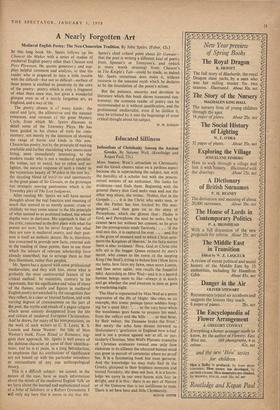Educated Silliness
Miss SIMONE WEIL'S attraction to Christianity and the Greek classics takes on a perilous aspect because she is approaching the subject, not with the humility of a scholar but with the precon- ceived notions of an enthusiast. She looks for evidences—and finds them. Beginning with the general theory that God seeks man and not the other way about, she writes: 'Notice, that in the Gospels . . . it is the Christ who seeks men, or else the Father has him fetched by His mes- sengers,' and then goes on to the story of Persephone, which she glosses thus : Hades is God, a.'d Persephone the soul he seeks, but he cannot have her without her consent, so he gives her the pomegranate seeds 'furtively.' . . . 'If the soul eats this, it is captured for ever . . . and this is the grain of mustard seed to which Christ com- pares the Kingdom of Heaven.' In the fairy stories there is also 'evidence.' Here, God or Christ (she tells us) is the beggar Queen reduced by men's deceit, who comes to the room of the sleeping King ('the Soul'), trying to waken him ('How fares my baby, how fares my fawn, once more I come, and then never again,' one recalls the beautiful tale). According to Miss Weil—and it is a hazard human beings seem to like—always it is touch and go whether the soul awakens in time or goes to everlasting night.
The Iliad is represented by Miss Weil as a poem expressive of the ills of Might. She cites, as an example, this ironic passage (poor soldiers long- ing for a quiet life): `. . , at the very hour when the woodsman goes home to prepare his meal, from the valleys and the hills . . . at that hour, by their valour, the Danaans broke the front.' But surely the echo here thrusts forward to Shakespeare's 'gentlemen in England now a-bed' and is not a protest against war at all, or par- ticularly Christian. Miss Weil's Platonic examples of Christian evidences remind one only how elaborate in its silliness the educated human mind can grow in pursuit of certainties where no proof lies. It is a fascinating book but most perverse. And the knowledge we may truly find in the Greeks, glimpsed in their brightest moments and named Necessity, she does not face. It is a know- ledge we carry in our own hearts with fear or delight, and it is this : there is no part of Nature or of the Universe that is not indifferent to man. There is no love here and little Christianity.
STEVIE SMITH










































 Previous page
Previous page